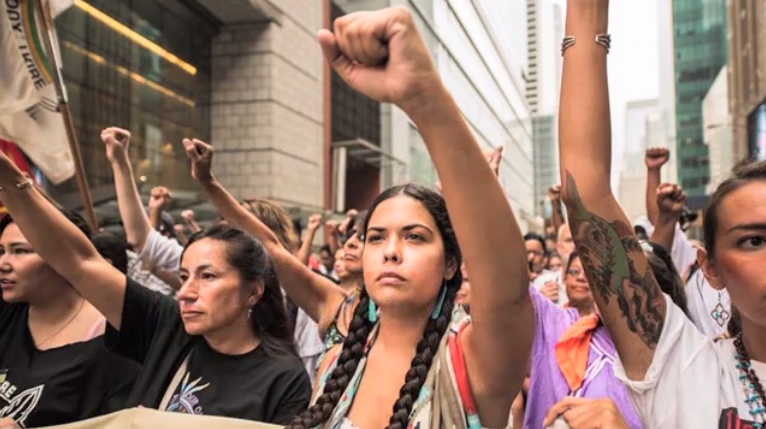On Thursday, June 1 2017, President Donald Trump announced that his government would withdraw from the Paris Climate Change Agreement. The U.S. now joins Syria and Nicaragua as the only countries not party to the agreement (Nicaragua said they did not sign on because it did not go far enough).

“This irresponsible and reckless action is consistent with his and the Republican party’s anti-environmental agenda, which threatens our sacred Mother Earth and the survival of our future generations,” says the International Indian Treaty Council (IITC) in a statement.
The group adds that, like Trump’s recent Executive Orders and Presidential memoranda fast-tracking the approvals for Dakota Access and the Keystone XL pipelines, “his latest action continues to put the interest of fossil fuel corporations above the Planet, its Peoples, and human rights.”
When the Paris Agreement was adopted by 194 States and the European Union in December 2015, some denounced it while others hailed it as an historic triumph. It is currently legally ratified by 147 countries.
“For Indigenous Peoples, who are on the frontlines of the climate crises around the world, the Paris Agreement was an incremental step forward for the recognition of our rights in international law. It also committed States to peak greenhouse gas emissions ‘as soon as possible,’ and to seek a balance between human-caused emissions and removals by carbon sinks,” stresses the IITC, an organisation of Indigenous Peoples from North, Central, South America, the Caribbean and the Pacific working for the Sovereignty and Self Determination of Indigenous Peoples and the recognition and protection of Indigenous Rights, Treaties, Traditional Cultures and Sacred Lands.
The group notes that the inclusion of “the rights of Indigenous Peoples” in the preamble of the Paris Agreement was achieved despite the consistent opposition of some countries throughout the process. “This addition remains a significant and unprecedented step forward because the preamble of a Treaty provides the context and framework for interpreting and implementing the entire document,” it declares.
The statement reads:
“Removing the U.S. from an agreement that specifically recognises the rights of Indigenous Peoples should be an additional cause for concern especially considering the recent U.S. no show at the Inter-American Commission on Human Rights hearing to review the human rights impacts of the President’s Executive Orders in March of this year.
“The Paris Agreement also called up on State parties (countries) to hold “the increase in the global average temperature to well below 2°C above pre-industrial levels and to pursue efforts to limit the temperature increase to 1.5°C above pre-industrial levels.” The 1.5 temperature goal was a core position not only for Indigenous Peoples, but for the Small Island Developing States in Paris. In addition, the Agreement affirms the need for a participatory, transparent, gender-sensitive approach based on science and ‘as appropriate, traditional knowledge of indigenous peoples and local knowledge systems.’
“The implementation of these decisions by State Parties remains a challenge. However, the recognition of the rights of Indigenous Peoples, the commitments to limiting temperature increases, and the recognition of traditional knowledge were core positions held firmly by Indigenous Peoples in their engagement with governments in Paris.
“Certainly, the Paris Agreement did not fulfill all the aspirations of Indigenous Peoples and fell short for many vulnerable States as well. But it provides a basis for future advocacy to ensure that all national and international programmes addressing Climate Change are carried out with respect for the rights of Indigenous Peoples as affirmed in the UN Declaration for the Rights of Indigenous Peoples. These include rights to lands and resources, free prior and informed consent, subsistence, traditional knowledge and Treaty rights, among others.
“The withdrawal from the Paris Agreement, along with all the other anti-environmental actions of the U.S. President and the Republican majority should be condemned by those who seek to create a better life for all Peoples and to fulfill our sacred responsibilities to Mother Earth.”
